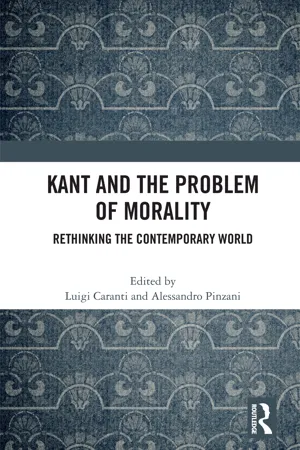
Kant and the Problem of Morality
Rethinking the Contemporary World
- 150 pages
- English
- ePUB (mobile friendly)
- Available on iOS & Android
Kant and the Problem of Morality
Rethinking the Contemporary World
About this book
This book examines the significance of Kant's moral philosophy in contemporary philosophical debates. It argues that Kant's philosophy can still serve as a guide to navigate the turbulence of a globalized world in which we are faced by an imprescriptible social reality wherein moral values and ethical life models are becoming increasingly unstable. The volume draws on Kantian ethics to discuss various contemporary issues, including sustainable development, moral enhancement, sexism, and racism. It also tackles general concepts of practical philosophy such as lying, the different kinds of moral duties, and the kind of motivation one needs for doing what we consider the right thing.
Featuring readings by well-known Kant specialists and emerging scholars with unorthodox approaches to Kant's philosophy, the volume will be of great interest to scholars and researchers of philosophy, politics and ethics. It will also appeal to moral theorists, applied ethicists and environmental theorists.
Frequently asked questions
- Essential is ideal for learners and professionals who enjoy exploring a wide range of subjects. Access the Essential Library with 800,000+ trusted titles and best-sellers across business, personal growth, and the humanities. Includes unlimited reading time and Standard Read Aloud voice.
- Complete: Perfect for advanced learners and researchers needing full, unrestricted access. Unlock 1.4M+ books across hundreds of subjects, including academic and specialized titles. The Complete Plan also includes advanced features like Premium Read Aloud and Research Assistant.
Please note we cannot support devices running on iOS 13 and Android 7 or earlier. Learn more about using the app.
Information
1 ON DEALING WITH KANT'S SEXISM AND RACISM
Introduction
1. Kant on the sexes and the races
1.1. Sexual difference and sexual hierarchy
1.2. Racial difference with and without racial hierarchy
Table of contents
- Cover
- Half Title
- Title
- Copyright
- Table of Contents
- List of contributors
- Acknowledgments
- List of sigla
- An introduction
- 1 On dealing with Kant’s sexism and racism
- 2 Kant the naturalist
- 3 Pleasure and displeasure as moral motivation
- 4 Inefficacy, despair, and difference-making: a secular application of Kant’s moral argument
- 5 Lying, deception and dishonesty: Kant and the contemporary debate on the definition of lying
- 6 The duty and the maxims: elements for a morality and culture of sustainable development
- 7 Kant as an ante litteram theorist and critic of the moral enhancement
- 8 Spielraum: narrow and wide duties and their consequences
- Index